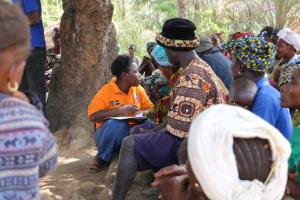Making every life count: Investigating a maternal death in Sierra Leone
FREETOWN, April 16, 2018 - Sister Hannah B. Palmer pulls on her boots, getting ready to set out on the latest field-level investigation of 2018. Her job is not easy. She is a Midwife Investigator in Koinadugu, one of the most remote and geographically dispersed districts of Sierra Leone. Much of the landscape here is steep and mountainous, and the district has one of the lowest densities of health workers and clinics, both relative to its population numbers, and the size of its geographical terrain.
Whenever a maternal death is reported in Sierra Leone, Midwife Investigators in each district are tasked with leading investigations into their causes through the Government’s Maternal Deaths Surveillance and Response (MDSR) programme, which is supported by UK Aid, UNFPA and WHO. Working together with a dedicated MDSR Committee, they aim not only to understand the medical causes of the death, but also the myriad of social factors that can play a part in the death occurring.
For Sister Palmer, this will often mean travelling hours across winding mountainous roads, to reach some of the country’s most isolated villages.
Today, she is investigating the death of 25 year old Aminata Kallon,* who after a complicated home birth, died tragically at the main district Government Hospital in Kabala. As part of the audit that is conducted, she and the Committee will retrace Aminata’s steps, talking to the communities where she stayed and where she went into labour, and exploring every interaction she had with the health system before her death took place.
“This is a sensitive but also really a valuable process, both for us in the healthcare system and for the communities,” explains Sister Palmer. “We take great efforts to explain that we are not there to police people, but rather that the MDSR process is about working together to prevent future deaths. These investigations provide an opportunity to identify tangible steps that can be taken at all levels to make deliveries safer for women and their babies,” she adds.
Over the course of the investigation, the MDSR team will go through the relevant case files at the hospital. They will visit the community where Aminata first fell sick, and conduct what is known as a ‘social audit,’ integrating community meetings and informal interviews. They will engage the traditional birth attendants who in the end, delivered Aminata’s baby at home. They will hear how Aminata experienced heavy bleeding during the delivery; how traditional medicines were given, but no help was called.
They will talk to Aminata’s sister, who eventually escorted Aminata to the government-run Community Health Centre in Bafodia. They will talk to the health workers there, who did everything they could and as quickly as they could to get help from the main government hospital.
During the community discussions, it will become clear that there were many contributing factors to the death, from the lack of a duly trained health worker within the privately-run clinic to the remoteness of the community, and the delays in seeking medical care. By the time Aminata finally arrived at the hospital in Kabala, it was three days after she first went into labour, and from when the bleeding began.
“Very often, there is a conglomeration of issues leading up to a maternal death, and no one person or no one factor to blame,” says Dr. Fatu Forna, Reproductive Health Specialist at WHO Sierra Leone. “This is why it’s critical to work together with all of the different actors involved, at all the different levels of the healthcare system and within the communities to identify actions that can be taken through pregnancy and delivery, to help ensure a positive and safer childbirth experience for all women.”
Supporting the timely reporting and investigations of maternal deaths is a core part of the government’s response to the maternal deaths situation in the country, with social audit and case reviews feeding into district and national level assessments and response. These findings are used to strengthen quality of care interventions, and ensure they are tailored to actual needs on the ground.
“We want to make sure these deaths do not happen again, and to let communities know that there are things they can do to prevent women from dying,” says Sister Hannah. “At the same time, the process also provides opportunities to identify and tackle the bottlenecks that exist within the health system.”
As a result of MDSR investigation processes, important interventions have been made to address avoidable gaps and delays. This includes making sure teams are on call to respond immediately when an ambulance arrives; pre-assembling emergency kits so that lifesaving drugs and supplies are on hand when needed; raising community awareness about the existence of maternal waiting rooms for those in remote areas, or strengthening skills of clinicians for undertaking particular procedures.
Of course, there are not always quick solutions, and sustained longer-term efforts to strengthen quality of care, expand access to health coverage for women and children in rural areas, and engage communities on the importance of early care-seeking behaviour and family planning will be crucial. However the attention, commitment and continued self-reflection generated through the MDSR process have an invaluable role to play in this journey, as the country looks to make sure every maternal death is counted, and that every woman’s life counts.
The Maternal Deaths Surveillance and Response Project is implemented by the Ministry of Health and Sanitation through generous financial assistance from the UK Government (UK Aid) and support from UNFPA, WHO and partners. In Koinadugu, the MDSR field investigations were led by the District Health Management Team and supported by Medicos del Mundos, WHO and IOM.
*Names have been changed
More information



